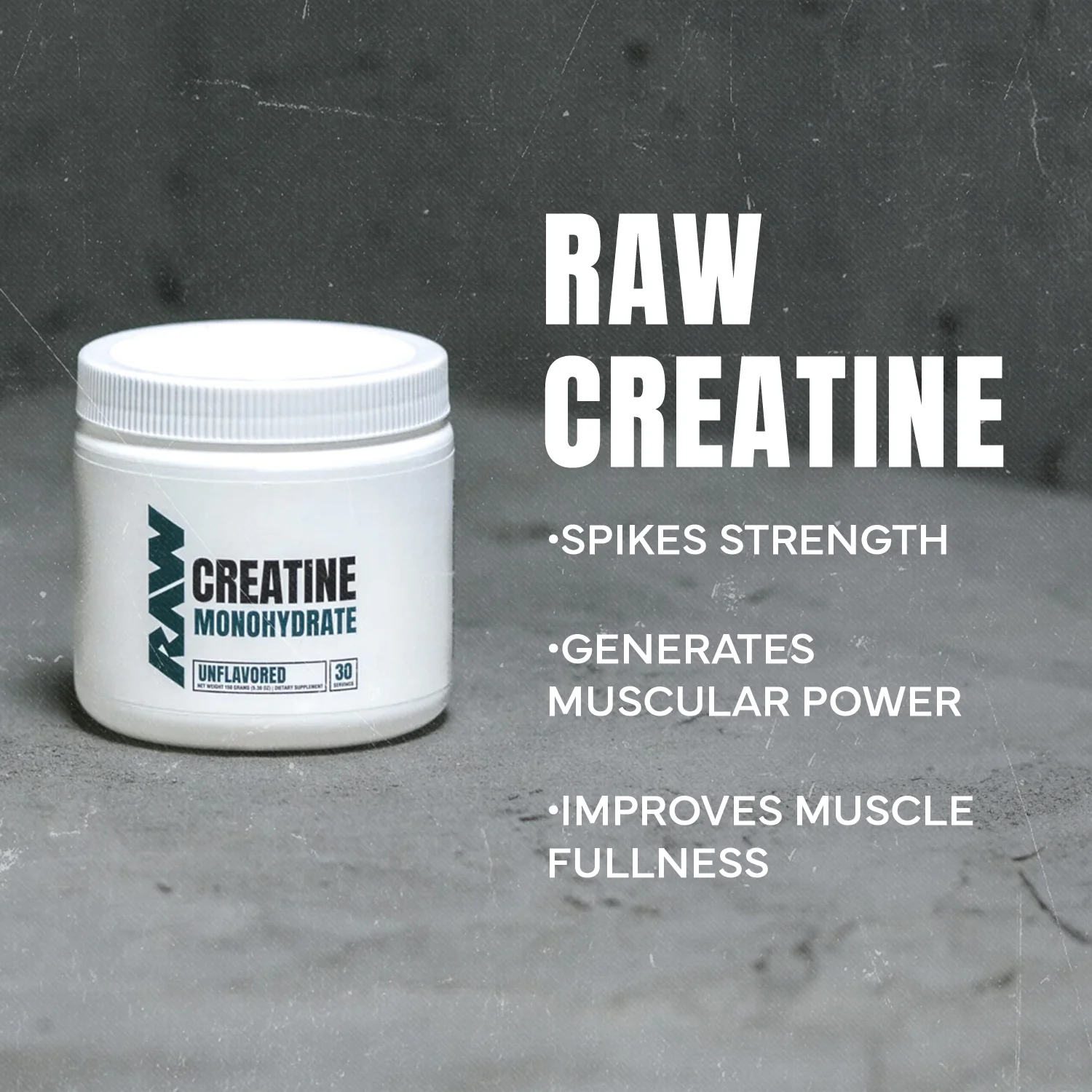
Creatine Monohydrate 101: Everything You Need to Know for Optimal Results
Introduction
Welcome to Getrawz’s ultimate guide to creatine monohydrate! Whether you're an athlete, a fitness beginner, or a trainer, you’ve probably heard about creatine’s transformative benefits for muscle growth, strength, and performance. This guide dives into the science, benefits, and practical tips on using creatine effectively to help you reach your fitness goals.
With insights on dosage, timing, and side effects, we’ll also cover People Also Ask questions like “What are the benefits of creatine?” and “Should it be cycled?” This way, you can approach creatine with all the answers in hand.
What is Creatine Monohydrate?
Creatine monohydrate is a naturally occurring compound found in muscle cells. It fuels high-energy activities like weightlifting and sprinting by producing quick bursts of adenosine triphosphate (ATP), which powers muscle contractions. Unlike other supplements, creatine isn’t a stimulant but a naturally synthesized organic acid stored in muscles to fuel explosive exercises.
- Source and Form: Naturally found in foods like red meat and seafood, creatine monohydrate is also available as a supplement, widely researched and known to increase strength and muscle size effectively.
- Popularity Among Athletes: Creatine is well-regarded in sports for its performance-enhancing effects. From Olympians to recreational gym-goers, people use creatine to level up their training routines.
How Creatine Works in the Body
When taken as a supplement, creatine boosts phosphocreatine levels in muscles, leading to quicker ATP production. Think of ATP as the primary energy currency for muscle contractions during high-intensity exercise. With elevated ATP, muscles have more immediate energy, enabling:
- Improved performance in high-intensity exercises,
- Reduced fatigue over multiple sets,
- Increased strength and endurance during short, intense activities.
The Science of Creatine’s Effectiveness
Extensive studies confirm that creatine supports everything from muscle growth to cognitive function. The increased water content in muscle cells also promotes protein synthesis, essential for recovery and muscle repair.
Benefits of Creatine Monohydrate
- Enhanced Muscle Growth: Creatine monohydrate helps increase the water content within muscle cells, promoting protein synthesis and signaling muscle growth.
- Improved Strength and Endurance: With more ATP at your muscles' disposal, you’ll feel a notable boost in strength and stamina.
- Faster Recovery: Creatine aids in reducing muscle soreness and shortens recovery time between workouts.
- Support for Cognitive Function: Some studies suggest that creatine may help improve memory and mental clarity.
Related Products: At Getrawz, we recommend pairing creatine with our BUM Hydrate or EAA products for comprehensive hydration and amino acid support.
How to Take Creatine Monohydrate
Dosage Guidelines
There are two common dosing methods:
- Loading Phase: For those who want rapid results, take 20 grams per day (divided into 4 doses) for 5-7 days, followed by a maintenance dose of 3-5 grams daily.
- Gradual Increase: Skip the loading phase by taking 3-5 grams daily from the start, though this approach might take a few extra weeks to achieve full muscle saturation.
Timing Recommendations
Timing your creatine intake can maximize its absorption and effectiveness:
- Post-Workout: Many experts recommend taking creatine after your workout with a carbohydrate source, as insulin spikes help with absorption.
- Morning: Some prefer morning doses for energy and hydration benefits, especially when paired with Getrawz BUM Hydrate.
Best Practices for Using Creatine with Other Supplements
Pairing creatine monohydrate with other supplements can elevate your results:
- Pre-Workout: A pre-workout supplement with caffeine and creatine can enhance focus and endurance.
- Protein Powder: Mixing creatine with protein powder helps boost muscle repair and growth post-exercise.
- Getrawz Fuel and EAA: To support extended recovery, Fuel offers energy while EAAs help reduce muscle breakdown.
Combining these supplements strategically ensures optimal hydration, endurance, and recovery support.
Potential Side Effects and Safety Precautions
Creatine monohydrate is among the most researched supplements, proven safe for long-term use when taken at recommended doses. Potential minor side effects include:
- Water Retention and Bloating: Creatine pulls water into muscles, potentially leading to mild bloating.
- Gastrointestinal Discomfort: Overdosing or taking creatine on an empty stomach can cause stomach discomfort.
- Dehydration: Drink enough water daily to counterbalance creatine’s water-drawing effects.
Safety Note: Those with kidney concerns should consult a healthcare provider before beginning creatine supplementation.
People Also Ask: Common Creatine Questions
What Does Creatine Monohydrate Do?
Creatine monohydrate is designed to increase ATP production in muscles, providing energy for high-intensity exercises. It enhances strength, endurance, and muscle recovery.
How Should You Take Creatine Monohydrate?
Most people benefit from a loading phase of 20 grams daily for 5-7 days, followed by 3-5 grams daily. Alternatively, you can start with 3-5 grams daily without a loading phase.
Is Creatine Safe to Use Daily?
Yes, creatine monohydrate is generally safe for daily use, but drinking adequate water is essential. Stick to recommended doses and consult a professional if you have pre-existing conditions.
Does Creatine Cause Weight Gain?
Creatine may cause a slight increase in weight due to water retention. However, this weight gain is beneficial for muscle health and strength.
Addressing Myths and FAQs about Creatine Monohydrate
-
Is Creatine an Anabolic Steroid?
Creatine is a naturally occurring compound that does not interfere with hormones. It’s safe and effective for improving performance without the side effects of steroids. -
Do I Need to Cycle Creatine?
There is no need to cycle creatine; you can take it consistently without reducing its effectiveness. Some people prefer cycles to avoid water retention, but it’s not necessary. -
Creatine HCL vs. Creatine Monohydrate: Which is Better?
Creatine monohydrate remains the most effective and affordable option, with extensive research supporting its benefits. -
Can I Mix Creatine with Other Supplements?
Yes! Creatine works well with other supplements like protein powders, pre-workouts, and amino acids.
Final Thoughts: Making the Most of Creatine with Getrawz
Creatine monohydrate offers a host of benefits for athletes, fitness enthusiasts, and anyone looking to boost their workout results. At Getrawz, we strive to provide top-tier creatine supplements to support your fitness journey. For those looking to pair creatine with other essentials, BUM Hydrate and EAA are perfect companions to keep you hydrated, fueled, and ready to perform.
Whether you're looking to add muscle mass, increase endurance, or simply enhance your athletic performance, incorporating creatine into your routine can help you achieve your goals.

Post Comment